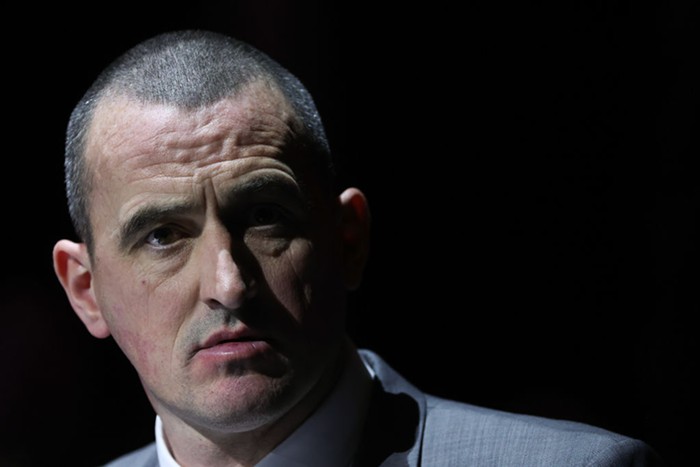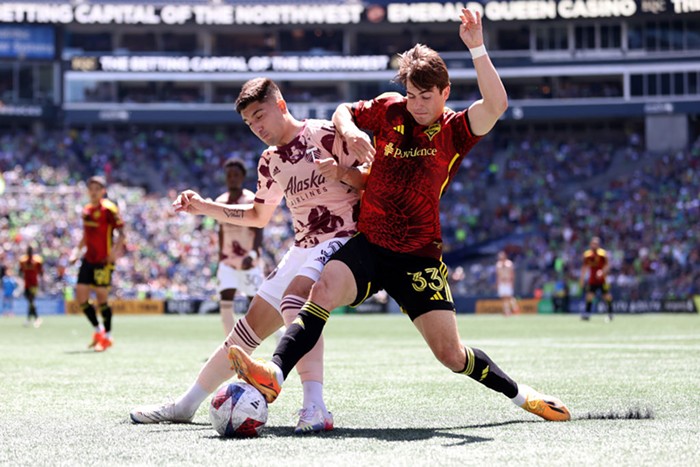
On Saturday night, playing without a number of starters, the Timbers were held to a home draw by the Colorado Rapids. On Thursday night, with a full compliment of starters against a heavily rotated Orlando City side, they could no better.
A late goal from Jeremy Ebobisse was all the Timbers could muster against the traveling Lions, enough to cancel out Santiago Patiño's opener at the end of the first half, but not enough to secure three badly needed points.
Now, the Timbers will travel to Seattle on short rest, having dropped four points in their last two home games, with the understanding that real estate further up the Western Conference table will not be so easily acquired.
The problem for Portland on Thursday night was twofold.
First, the Timbers looked tired. They've played nine times in the last five weeks and four times in the last 12 days, and while no single player has featured in all of those contests, the weight of all those minutes began to show.
Some players looked worse off than others. Sebastian Blanco, for instance, who did start all three games last week, was plainly exhausted. Zarek Valentin, whose extraordinary mental lapse led to Orlando's goal at the end of the first half, is another who hasn't gotten a day off in weeks and was nowhere near his best.
Giovani Savarese's decision to play his best available group in this game — and not to give any of his key players a rest — means that it will either be rotated or even more fatigued when it walks onto the pitch at CenturyLink Field in three days' time.
The calculation was that this, at home, against a weak opponent, was a game that the Timbers had to have.
But they couldn't get it done. Orlando came in, sat ten players behind the ball, and stayed compact through the middle — and the Timbers, with the exception of that late goal from Ebobisse, couldn't figure out how to break them down.
Portland's control of the run of play in this match was absolute. They had 63 percent possession, outshot the Lions 26-2, and attempted a staggering 41 crosses. Those two shots Orlando managed both came in the first half; Steve Clark didn't make a single save all night.
That the Lions were anemic going forward was no surprise. Their front line, which consisted of a journeyman just traded to the club for $50,000, a rookie, and a career NASL forward, could barely string two passes together.
They came here to defend, just as Colorado did on Saturday, and just as a great number of the teams yet to make their trip to Portland this season will do in the coming weeks and months.
That's because the second problem the Timbers have, magnified over the last several days, is this: when they don't get opportunities to attack in transition, where no club in MLS is more lethal, they struggle to generate high-quality chances.
The 41 crosses the Timbers delivered in this game, the majority of which came when the only Timbers forward on the field was the 5'7 Brian Fernandez, tell that story clearly enough.

But the former Timbers captain, who entered the match after Alex De John suffered an early injury, held his own. Andy Polo fared no better on the other wing, and Fernandez struggled to involve himself at all. For the most part, it was harmless crosses and long-range shots.
On a handful of occasions the Timbers did combine expertly, most often with Diego Valeri pulling the strings, and nearly lead when a Blanco header hit the bar and then ricocheted off the back of Orlando's reserve goalkeeper Greg Ranjitsingh.
Ranjitsingh was forced into one strong save on a Fernandez shot, but as the conclusion of the first half neared, the Lions were winning the battle defensively — though they appeared absolutely no threat to score at the other end of the field, and were thus playing with an extremely thin margin for error.
Then, out of nothing and nowhere, they took the lead. Battling for possession along the left touchline, Valentin stooped down to pick up a ball that he thought was out of play but instead had it stolen by Robinho, who raced towards goal and sent in a cross that Jorge Moreira deflected to Patiño, who knocked it in.
It was, from a player of Valentin's intelligence, a shocking, once-in-a-career mistake — and it made the Timbers' job heading into the second period of play that much harder.
Sure enough, after the restart, the Timbers continued to labor. On the hour mark, Savarese made the obvious and correct move: he inserted Ebobisse for Polo, giving the Timbers a true target in the box and diverting the attention of Orlando's central defense away from Fernandez.
The attack improved, but still couldn't conjure a clear-cut chance. As it happened, it'd be a mistake from an Orlando player that would provide the springboard, finally, for the equalizer. The distribution challenged Patiño left a pass short for Jonathan Mendez, Valeri slid in, and the Timbers broke forward.
Moreira, now playing in midfield, picked up the ball in stride and whipped a cross into the box. Fernandez stooped to meet and flick it on, and Ebobisse, lurking on the backside, redirected it off the post and in to level the score.
The Providence Park crowd, frustrated for so long, erupted. With more than ten minutes to play and two forwards on the field, it seemed like the Timbers might just go on and win the game after all.
But despite a generous seven minutes of stoppage time, they couldn't again trouble Orlando's defense. In the entirety of the second half, they managed just one other shot on target.
Orlando manager James O'Connor was predictably pleased with his side's performance, but there was nothing much to it: they defended with competence and commitment, stole a goal when the chance presented itself, and are taking a point home to show for it.
Savarese, on the other hand, has his work cut out for him. The Timbers have far too much attacking talent to only be able to play on the counter. Given the way the rest of their schedule sets up, it is of the utmost importance that they figure out how to score goals in other ways.
First, though, it's the Sounders on Sunday. Win that game, and this one, and the one preceding it, will be but a faint and distant memory.

















